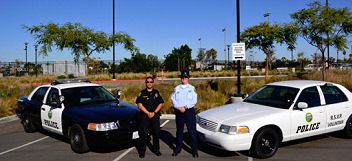
By Shannon Michael
March 24, 2012 (San Diego) – In today’s tight budgetary times, local law enforcement departments are getting a hand from retired senior volunteer programs (RSVPs). How do these dedicated volunteers help our communities—and how do programs at different agencies compare?
There are two major differences in many of the various units. One is the mere patrol of certain areas while another is the You Are Not Alone (YANA) service to those who need assistance and/or support and are not able to get out to find that service due to either illness or they might be handicapped.
All RSVP patrol members are non-enforcement and non-confrontational. But responsibilities vary. One patrol may have the ability to write citations for handicap parking violations, others may not. There are also “abandoned vehicle” searches in almost every one of the RSVPs, but there are limits to how volunteers may respond.
The radios given to the RSVPs use an almost standard radio code such as 10-4 or 10-42, the first meaning “I understand” and the second meaning “off duty.” The in between numbers might vary, but they are all understood by the different RSVP units in the many cities around San Diego as well as throughout the country.
The RSVPs, as with the CHP, often deal with reports of traffic complaints or abuse of laws reports. The resolution of those reports requires making calls to those who have a concern and advising them of the situation.
The various cities, and the newest community college RSVPs, will often share the same concerns of parking and traffic control, but with some exceptions which are regulated by the agreements with the various Police Officer Associations (POAs) as to how much of what the RSVP can do. Community colleges are not allowed to cite parking violations, but they can do traffic control of students and the cars in the college campus areas. But, there is a limit on what the RSVPs can do there as well since the RSVP cannot take on responsibilities the sworn officers have agreed to through their POAs.
CHP and SDPD RSVPs do fingerprinting as do some of the others, but these are now so easily done with digitals that the “roll your finger” method is almost obsolete.
None of the RSVPs are allowed to carry firearms at any time. The RSVPs cannot and it is clear they should not attend to any situation where an officer calls 11-99 or Officer Needs Help. The RSVPs cannot detain or hold any person against their will.
Some RSVPs might attend Neighborhood Watch meetings to advise the people on certain new information available. However, this is done almost every meeting with a sworn officer present; this to limit the liability of making an error of law.
Every RSVP unit is required to have two person teams at all times. SDPD Traffic, however separates the two in the case of traffic control where one of the members is at one end of a scene and needs to keep contact with the other member perhaps as far away as hundred yards or more in loud vehicle noises where shouting will not work for them.
The two person team means they can relate facts as they appear and confirm one is telling the story as it happened. Two person teams are a protection as well, against “he said she said” charges against any member.
Most RSVPs wear a light blue shirt with dark blue trousers. Some units have white shirts and blue trousers. RSVP Administrators and Assistant Administrators wear Captain’s bars and Lieutenant bars respectively. Squad or special units, such as Field Training Officers (FTOs) often wear sergeant stripes. These are much the same as military signs of rank, though one unit uses Warrant Officer insignia for the same level of responsibility.
RSVPs at the La Mesa Police Department cover youth sport events for both deterrence as well as crowd control. College RSVPs will attend athletic events for assistance with parking and directing visitors to different sections of the stadiums or arenas.
RSVPs as a whole are a money saving way for a community to assist the police and sheriff and highway patrols to get jobs done. For instance, is it sensible to pay an officer to go visit a shut-in or pass out literature on campus to talk to a student about home work or wave their arms in traffic control? A well trained RSVP can do the same thing and relieve the officer to get police work done.
San Diego PD reports millions of dollars saved to the taxpayer through their RSVP program and the others have savings in percent of tax revenues spent on policing , since RSVPs can provide many of the services with little or no expense beyond a uniform and badge.
It has been said that “community volunteering is a noble endeavor;” unquestionably RSVPS are valued assets for our communities.








Recent comments